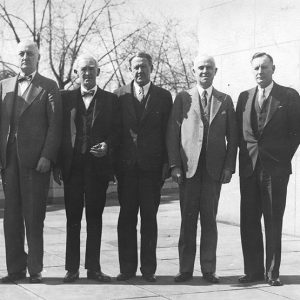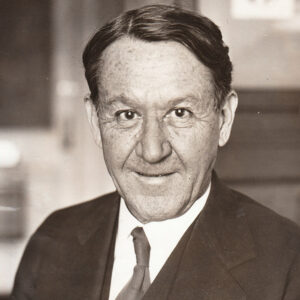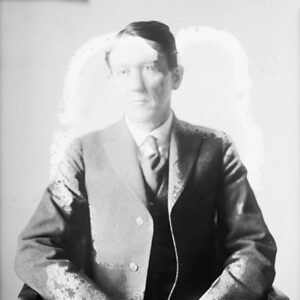calsfoundation@cals.org
Tilman Bacon Parks (1872–1950)
Tilman Bacon Parks was a Democratic member of the U.S. House of Representatives. He represented the Seventh District of Arkansas in the Sixty-Seventh through the Seventy-Fourth Congresses, serving from 1921 to 1937.
Tilman B. Parks was born near Lewisville (Lafayette County) on May 14, 1872, to William P. Parks and Mattie Douglass Parks. He received his early education in the local common schools before attending the University of Texas at Austin and the University of Virginia at Charlottesville. Parks married Fay Newton on March 4, 1897, and they had a son and two daughters. He studied law and was admitted to the state bar in 1900, after which he opened a private practice in Lewisville. While still developing his practice, he ventured into politics. Winning election to the Arkansas House of Representatives, Parks ultimately had two separate tenures in the state legislature, serving from 1901 to 1904, before serving again from 1909 to 1911.
The Democratic Party chose him to serve as a presidential elector in 1904 as well as the temporary chairman of the state Democratic Convention in 1910. In 1914, Parks became prosecuting attorney for the eighth judicial district, a position he held until 1918.
In 1915, Parks moved to Hope (Hempstead County), where he opened a new law practice. In 1920, Parks sought election to the U.S. House of Representatives. After defeating incumbent William S. Goodwin in a hotly contested primary, he easily won the November general election with more than seventy percent of the vote. It was the beginning of a lengthy tenure in Congress, as Parks was reelected to seven more terms, frequently running unopposed. It was not until his final three terms that the Democratic Party was in the majority, however, and that political reality limited his influence. While in Congress, Parks served on the Accounts Committee, the Education Committee, and the Expenditures of the Interior Committee, as well as the Rivers and Harbors Committee in his first term. Later, he served on the Interstate and Foreign Commerce Committee, and then, in his final three terms, with the Democrats in the majority, he was a member of the powerful Appropriations Committee, a position from which he could direct spending to the state.
In 1934, Parks was challenged for re-nomination by local attorney Wade Hampton Kitchens. It was a hotly contested race, and while Parks ultimately retained his seat, it was only after a major political and legal struggle. Indeed, a spring 1935 ruling by the federal court overturned Parks’s August 1934 primary victory. Backing Kitchens’s allegations of fraud, the court declared Kitchens the rightful primary winner. However, given the constitutional provision that made the House the judge of its members, and the fact that Parks had been sworn in that January based on the general election results, the court found no legal grounds to call a new election. At the same time, with his political vulnerability clearly apparent, Parks opted to retire in 1936.
After retiring, Parks stayed in Washington DC and practiced law. He had been widowed since 1928 and lived with his son, Tilman B. Parks Jr., until his declining health forced him to be institutionalized. For the last six years of his life, Parks was a patient at the Washington Home for Incurables. He died in Washington DC on February 12, 1950, and is interred in the Congressional Cemetery.
For additional information:
“Tilman Bacon Parks.” Biographical Directory of the United States Congress. http://bioguide.congress.gov/scripts/biodisplay.pl?index=P000075 (accessed September 16, 2021).
“Tilman Parks Dies, Former Congressman.” Arkansas Gazette, February 13, 1950, p. 1.
William H. Pruden III
Ravenscroft School
 Early Twentieth Century, 1901 through 1940
Early Twentieth Century, 1901 through 1940 Congressional Delegation, 1934
Congressional Delegation, 1934  Tilman B. Parks
Tilman B. Parks  Tilman Parks
Tilman Parks 




Comments
No comments on this entry yet.